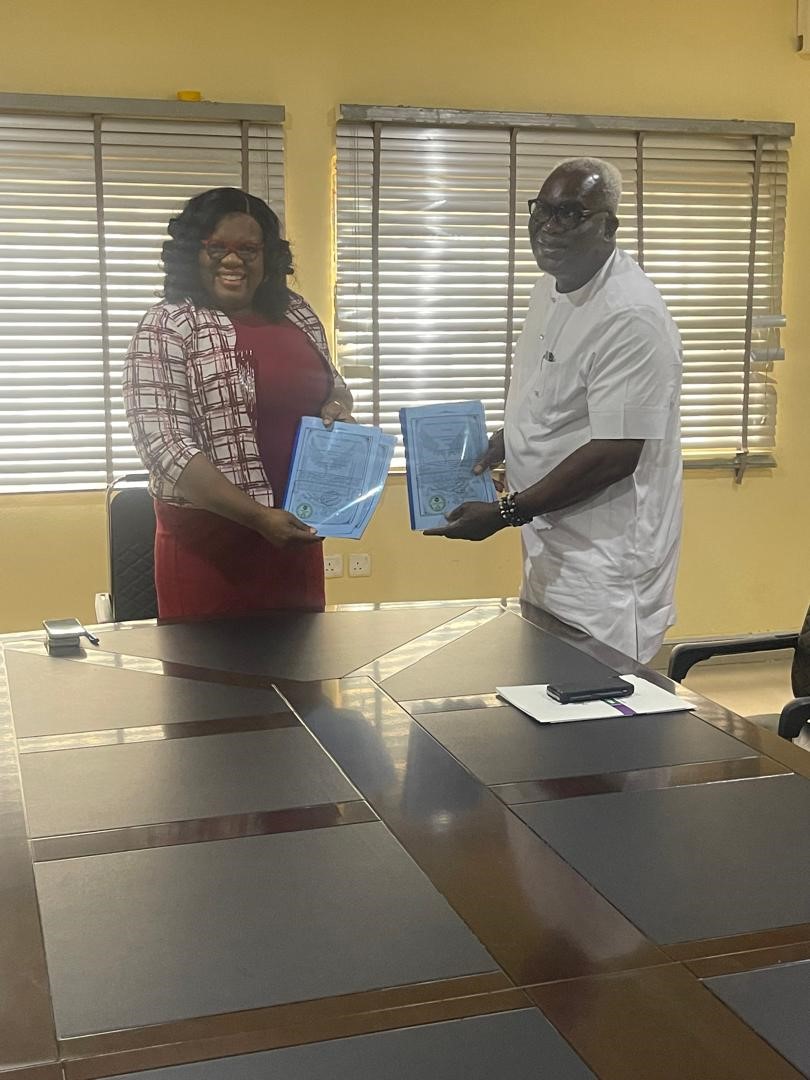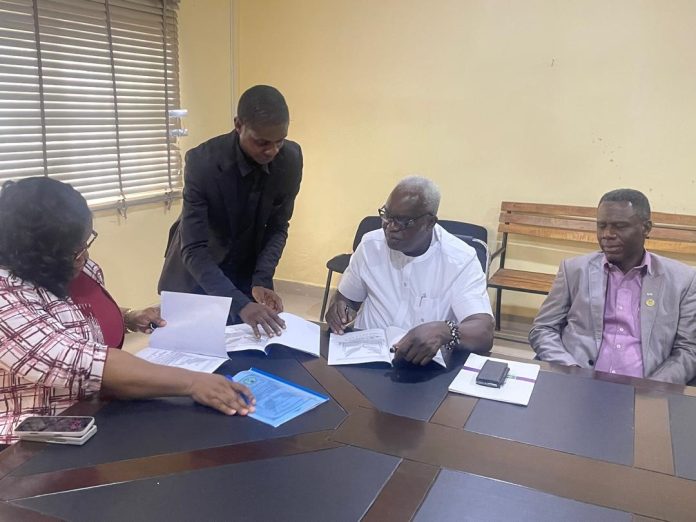
BY RITA OYIBOKA
IT is not every day that history is written in the sterile corridors of a hospital. But on September 22, when the Asaba Specialist Hospital (ASH) sealed a Memorandum of Understanding (MOU) with Dennis Osadebay University (DOU), Asaba, a new chapter opened for Delta State’s healthcare and medical education.
The agreement, signed amid applause from stakeholders, promises to transform not only how medical students are trained but also how healthcare is delivered across the state. For a government already making giant strides in the health sector, this is a defining moment, one that blends vision with action, and ambition with execution.
The Significance of the MOU
The MOU between ASH and DOU is far more than a symbolic handshake. It cements a partnership that will position ASH as the teaching hospital for DOU’s College of Medicine. This means that within the next few months, as DOU prepares to officially roll out its medicine program, students will have access to handson training at the facility. Allied courses are already in full swing at the university, including Nursing Science, Medical Laboratory Science, Optometry, Human Physiology, Anatomy, Public Health, and Human Nutrition. The missing piece, medicine itself, is now on the horizon.
This collaboration is also proof that the vision behind establishing DOU in 2021, carved out from the former
Delta State University, Anwai Campus, is steadily becoming a reality. The institution, named after Chief Dennis Osadebay, Nigeria’s first Premier of the defunct Mid-Western Region, was designed to immortalise his legacy by producing the next generation of leaders and innovators. Today, with the ASH partnership, that vision has a sharper focus: producing world-class medical professionals.
A Hospital with a Growing Legacy
Since its commissioning in June 2021, the Asaba Specialist Hospital has grown beyond expectations.
Under the leadership of Chief Medical Director, Dr. Peace Ighosewe, the hospital has steadily transformed into a beacon of modern healthcare. State-of-the-art facilities, including advanced diagnostic machines, dialysis units, and upgraded wards, have made ASH one of the most reliable medical centers in Delta State.
The Medical and Dental Council of Nigeria (MDCN) had already designated it as a teaching hospital for Novena University in 2024. Now, with the DOU MOU, ASH has expanded its influence, firmly cementing its place as a hub for training and healthcare innovation.
The upcoming visit of the Asagba of Asaba, Obi Prof. Chike Edozien Azinge on Thursday, September 25th, accentuates the cultural and communal importance of the hospital’s growth. The monarch, who has been instrumental in supporting DOU, including his pledge of N100 million donation earlier this year to establish a
Faculty of Law, remains a strong advocate of partnerships that drive development. His planned tour of ASH is a seal of cultural endorsement, tying tradition to progress.
Government’s Strides in the Health Sector
The MOU comes at a time when Delta State is reaping the benefits of targeted investment in healthcare under Governor Sheriff Oborevwori’s #MOREAgenda (Meaningful Development, Opportunities for All, Realistic Reforms, and Enhanced Peace and Security). Since assuming office in 2023, Oborevwori’s administration has upgraded more than 150 primary healthcare centers across all 25 local government areas. From CT scanners to MRI machines, modern diagnostic equipment has been deployed in hospitals statewide. Dialysis has also been made more affordable, a bold step in easing the burden of kidney-related ailments that are increasingly common in Nigeria.
Healthcare access has expanded significantly. Through the Delta State Contributory Health Commission
(DSCHC), over 40 per cent of the population now enjoys health insurance coverage. Vulnerable populations have benefited from programs such as D-CARES, which reached over 250,000 residents with cash support, healthcare access, and agricultural inputs. Maternal and child health has also been prioritized, with over 331,000 girls vaccinated against HPV in just over a year under the OYA Campaign.
Human capital development in the health sector has not been left behind. Recruitment and training of doctors, nurses, and other healthcare professionals have been scaled up to reduce the impact of brain drain. New institutions such as the College of Health Technology in Ovrode and the College of Health Sciences at Southern Delta University, Ozoro, are equipping the next generation of health professionals.
The Nigerian Medical Association (NMA), Delta State chapter, recently commended the administration for these bold steps.
Linking Education with Healthcare Delivery
The ASH-DOU partnership is a strategic attempt to bridge the persistent gap between medical education and practical healthcare delivery. In Nigeria, where many medical students often struggle to gain adequate clinical experience, the collaboration provides a clear pathway: theory learned in classrooms will now be tested and sharpened in ASH’s theatres, wards, and laboratories.
This synergy is expected to produce graduates who are not only academically sound but also practically equipped to tackle real-world medical challenges.
Delta State already has a proven model with the Delta State University Teaching Hospital (DELSUTH), Oghara. Affiliated with Delta State University (DELSU), Abraka, DELSUTH trains medical professionals across over 20 specialties and recently secured West African and national accreditations in surgery. With ASH now playing a similar role for DOU, Delta has effectively doubled its teaching hospital capacity, a rarity among Nigerian states.
The Bigger Picture: A Regional Hub for Healthcare
By establishing strong ties between its universities and hospitals, Delta State is positioning itself as a regional hub for medical education and healthcare delivery. This model is consistent with global best practices where teaching hospitals serve as crucibles of research, innovation, and service. For ASH, the MOU means increased visibility, higher patient inflow, and opportunities for research funding. For DOU, it provides a platform to attract top-tier faculty and students.
But perhaps the biggest winners are ordinary Deltans. Improved healthcare services mean fewer trips to Lagos, Abuja, or even overseas for medical treatment. The ripple effect includes increased confidence in local healthcare, reduced medical tourism, and ultimately, economic savings for families and the state.
Looking Ahead
The 2025 budget of N936 billion signals that healthcare remains a priority for Delta State, with significant allocations for infrastructure and personnel. Ongoing projects, including vehicle donations for health patrols and further expansion of facilities, point to a government unwilling to rest on its laurels.
The ASH-DOU MOU is, therefore, both timely and strategic. It strengthens Delta State’s healthcare infrastructure, deepens its academic capacity, and signals to the world that the state is serious about its people’s health. For a government seeking to leave a legacy of meaningful development, this is one initiative that ticks all the right boxes.
The partnership between Asaba Specialist Hospital and Dennis Osadebay University is more than an agreement on paper; it is a bold statement about the future of healthcare and education in Delta State. It ties together government investment, institutional growth, cultural endorsement, and the aspirations of young Nigerians dreaming of medical careers. If managed well, it will not only produce skilled doctors and nurses but also ensure that every Delta resident, from Asaba to the remotest villages, feels the impact of a healthcare system finally rising to its full potential.
This is not just a story about a hospital and a university; it is the story of a state reimagining its future through health, knowledge, and partnership.


